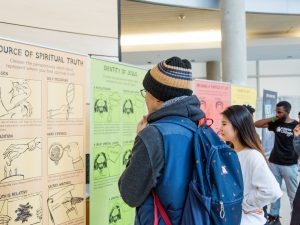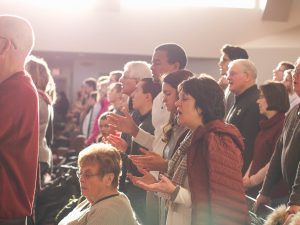I’ve decided that this is the week. I’m finally going to get to know my neighbours. I’ve read more than enough to be convinced that my neighbours actually matter. I mean they’re humans, as far as I know, so they bear the image of God in some way (Gen. 1:27). Jesus tells me to love them (Lev. 19:18, Matt. 22:39, Mark 12:31). He even shows me how to love them in the ways he treats the sick, the poor, and the sinner. I’ve got all of the facts so here I go!
…
Fast forward to the end of the week. I’ve had one short conversation with one neighbour, an awkward exchange with another, and I spent most of the week holed up in my house with little chance of ever having a face-to-face interaction with anyone on my street. Now I feel guilty and sad and ready to spend the weekend ignoring all of those emotions using the magic of television.
So what’s my problem? Well, I’ve got a lot of them, but in this case in particular (after actually engaging with my emotions instead of ignoring them), I can identify some of my top barriers: time, fear of man, and a love for comfort.
Time
Like everyone else in Canada, my life can get pretty busy. Between work, family, friends, and church my days get pretty full. If I’m being honest, though, I also can spend a lot of time on things that should probably matter less to me than my neighbours. Those things that aren’t exactly bad, but that I would be afraid to calculate the amount of time I’ve spent on them. Things like social media, TV/movies, video games. I can’t seem to prioritize my neighbours over these things.
Jesus shows us a better way. He gives his time to crowds of people: healing them, providing for them, and loving them. Jesus didn’t waste a single second in his life. I can’t even begin to imagine what a life like that would look like. Jesus, though, doesn’t just leave us with an impossible standard to live up to.
He shows a better way to prioritize our lives by giving us the Great Commandment. We are meant to love him first and love our neighbours as ourselves. This means that all of the things we spend our time with will flow out of genuine love for Jesus and our neighbours. Then Jesus bears the sin and shame of our wasted time, and provides the Holy Spirit as the power we need to prioritize others over ourselves. We don’t have to sit in a cycle of wasted time leading to shame leading to more wasted time. Jesus frees us to love others as ourselves.
We don’t have to sit in a cycle of wasted time leading to shame leading to more wasted time. Jesus frees us to love others as ourselves.
Fear
Some people live life without inhibitions. Me? I have all the inhibitions.
I can easily convince myself that any interaction I have with a stranger will be interpreted poorly. They will probably think that I’m creepy for talking to them or just trying to sell them something. I’ve predicted the future and it doesn’t look bright so why should I even try? Logically, I know that they’re probably just as scared and lonely as I am. They probably would love someone to talk to about more than just the weather. They want to be known and loved as much as I do, but vulnerability can be scary.
Tim Keller puts it like this: “To be loved but not known is comforting but superficial. To be known and not loved is our greatest fear. But to be fully known and truly loved is, well, a lot like being loved by God.”
This is exactly what Jesus gives us. He knows us—our hidden secrets and deepest shames—and yet he willingly steps up to bear the weight of all the wrong we’ve done on the cross. Our neighbours could know the worst of us and reject us, but ultimately we are fully accepted in Christ. Rejection is a real risk, and potentially very painful. But it pales in comparison to the unconditional love of Jesus. We have nothing to lose from loving our neighbours honestly and vulnerably.
Comfort
I like the easy way out—the shortcut, the path of least resistance. I like to be comfortable. Loving my neighbours seems like a time-consuming, emotional experience that I would never naturally desire. I just wish I had the boldness to be like Ron Swanson from Parks and Recreation, who upon meeting his new employees says, “If you show up on time, speak honestly, and treat everyone with fairness, we will get along just fine. Though, hopefully, not too fine as I’m not looking for any new friends.” That’s all I want to say most of the time, but I know that I’m called to be welcoming, and joyfully so.
When Jesus left heaven to come and live in a human body, it must have been impossibly uncomfortable. Jesus didn’t even live as a powerful ruler but as a humble carpenter, in a day and age without healthcare, cars, or the internet. He descends into greater depths of discomfort when he submits himself to death on a cross. He lived an extremely hard life that makes whatever I complain about look silly.
Yet again, though, he doesn’t leave me with an impossible comparison in order to pile on the shame. He shows me that true comfort is found in himself; that whatever comfort this life offers apart from him is fleeting. I need to take my eyes off what might feel most immediately comfortable and lift them up to see eternal, full comfort—comfort that endures current hardships, potential embarrassment, and the awkwardness of establishing new friendships in order to reach new levels of joy in the future.
I know that I’m called to be welcoming, and joyfully so.
The courage to start
Yet, even after identifying each of these barriers and applying the gospel to them, I’m still too overwhelmed to start. There are so many neighbours living on my street, more neighbours than I currently have friends. I’m also choosing to ignore how Jesus uses the story of the good Samaritan to expand the definition of neighbour to essentially include every person we see in need of help every day, and with technology today maybe every person I connect with online could be my neighbour and now I have too many neighbours to keep track of and I don’t speak the same language as some of them and some of them live oceans away and I don’t have the time or the money or the emotional energy to be a good neighbour to all of them and…and…and…
Having taken a break to gather my thoughts and calm my emotions, I hope I’ve gained some perspective that will stop me from being overwhelmed with this monumental task.
First, people are diverse and have diverse needs. Loving a neighbour could be as simple as a pleasant greeting one week and as complicated as multiple hospital visits the next week. The call to love our neighbours does not mean we have to load everyone into an Uber, send them to the nearest Holiday Inn and order SkiptheDishes for them every day until they recover. The same love of Christ in us produces different actions from us depending on who we are loving.
Second, we are not alone. Jesus gives us his Church to help us along the way. We don’t have to work alone to love our neighbours, but can work together to meet needs within our communities. The Church, like our neighbours, is also diverse. We’re not all good at making meals, welcoming people in, talking through problems, or fixing sinks, but within the Church, there are people who can love their neighbours in all of those ways. We can all use the gifts, skills, and knowledge God has given us to love our neighbours together!
Loving our neighbours will be difficult. We can come up with a thousand excuses to not even start. Jesus, though, doesn’t simply command us to love our neighbours. He gives us everything we need to do it. He removes our sin and shame, redeems the missed opportunities, gives us the Holy Spirit to guide us, and unites us with other believers in his Church. In Christ, there is still hope for our neighbours.
"*" indicates required fields
Share this!
About the Author





